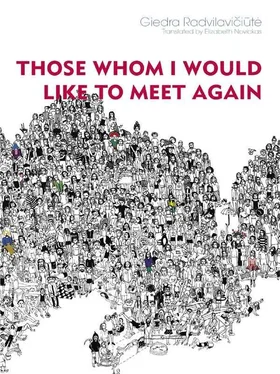When I wasn’t feeling quite so morbid, I’d think along these lines: a single square meter of a similarly neglected apartment in a similar Old Town neighborhood would go for about three thousand litai. Perhaps I’ll make Vitia a deal on my half of the common space. He would be absolutely delighted, I’m sure. And then, all that would remain would be to brick over the door from my kitchen to the common corridor. This might even result in an interesting effect. I could go over to the door, open it, and be faced with a dead-end plastered wall. I should think up some truism, some especially compelling thought to paint on that wall. I’ll get about twenty-five thousand litai, I’ll convert them to euros, and have teeth put in that I don’t need to take out at night … At the very least, I’ll have convinced myself that volume has the power to turn into circumference. But let’s say I didn’t succumb to the temptation to sell that space after all. Perhaps I could make a storage space out of the eight square meters of my half of the corridor — to store books in, and shoes, and my long-dead grandmother’s Singer sewing machine. She bought it at the beginning of the twentieth century and used to travel through many Lithuanian villages with it, sewing. Many people associate Singer sewing machines with their loved ones. The most intimate story I’ve heard about a sewing machine was told to me by a carpenter, now dead. He was making bookshelves for my husband at the time. He told me the story over the telephone, drinking a second bottle of Georgian wine he’d uncorked by smacking the bottom with his fist; I heard the blow over the receiver. He was sitting at home, alone. He couldn’t go get the corkscrew because his leg was hurting really badly that day. Earlier, he had said that when they finally amputated, it would take him only a few days to make himself a wooden leg, hollow on the inside. Out of a pine growing by his mother’s grave. But then, as he drank, he thought up another excuse for having opened his bottle in that macho way; he said he’d wanted to check if his hands were as strong as they were in his youth. And then came his story. Which was terrifying, frankly. Because all stories in which the main characters are time, a person’s loved ones, and objects that come to life are horrible. But, you know, it was very well told. A piece of perfect storytelling. And just as I was opening my mouth to ask him to let me use a detail of his story in my own work — before I had even begun a coherent sentence, merely pronounced the little word “maybe”—the carpenter interrupted me in his calmly masculine way and said, “And don’t you dare ever even try to tell that story to anyone else.” I was ashamed.
Lately, getting old so much more quickly than is proper, I hear the clatter of my grandmother’s sewing machine more and more often. Then other things “glue” themselves to the sound: a ficus, the smell of potato pancakes, and she herself. She keeps tucking a strand of her hair behind her ear. As if she were voting before an unseen audience at a Soviet Congress, from time to time she slows the sewing machine by holding back the hand wheel with a raised palm. She curses out her crooked stitches in Russian. Nowadays, the Singer lives in a friend’s house — a remote single-family house in Pavilnys. Inside the Singer’s base, in a veneered space, were kept two thimbles — one of brass and one of iron. Grandmother called them noparskai . On her name day, February 16th, St. Ona’s, the thimbles, quietly clinking in the dark, would drink, one from the other, the last drops of the sewing machine’s oil, then curl up to drowse in a narrow torn-off little piece of hide once cured by my grandfather. It’s funny, but I think I’d like to be buried there, I mean back home, denying the modern world (or perhaps simply scorning it), and as close as possible to my loved ones and the things of my childhood, even though this isn’t possible. I’ve been living in the capital for forty years now. When I die they’ll take me to Rokantišk  s cemetery.
s cemetery.
When I think I’ve scrupulously weighed every single possibility, as far as the division of the corridor, I meet with Vitia. I’d only ever seen him from a distance — at the lawyer’s, sitting with the old owner of the apartment. He didn’t come over to my place — he went straight to his half of the apartment. With a friend. Whom he introduced as Petrarka. Undoubtedly his name was actually Petras. And this Petrarka smiled, setting a bottle of schnapps and two plastic glasses (the words we use for such vessels have never made any sense to me) on a stool in Vitia’s empty living room, not saying a word. He was the sort of person who only speaks when something surprises him. And gets surprised only rarely. Petrarka scratched at the wallpaper, but when he found another layer of paper under it, and then another, and after that, quite unexpectedly, yet another, he poured himself some vodka. Vitia really had been born on Tyzenhauzai Street, but didn’t otherwise correspond to my imaginings in any respect — short, stocky, a bit plump, like a former athlete; with a sad, sly smile, not at all a “Lenten face.” His goatee, fastidiously shaved every morning, was an exceptionally poor match with his rough palms. Which is when I realized that he’d spent approximately fifteen years leading another sort of life entirely. Perhaps one that wasn’t quite legal. And because his past didn’t correspond to his present, yet another option for dividing the apartment shot into my head. In essence, I had only one question left for Vitia, so I asked it: “Have you bought this apartment as an investment, or to live in?” He answered, “I’ve gotten divorced from my wife, and I’m buying this apartment to die in. I’m just a bit short on space and money.” That’s what I thought. Space and money are in short supply for almost everyone, even someone prepared to die. So I asked him to come over to my side of the building and, very efficiently, without witnesses, without emotion, I laid out the third possibility for dividing the apartment. Which is to say, I offered eight square meters of space to a man whose past didn’t correspond to his present. In the Old Town. Without asking for a dime. (But in exchange for a single service.)
When we quietly returned to Petrarka a half-hour later, he was sitting on the windowsill, completely drunk, cleaning out his fingernails with a foot file — I have no idea where he got it. Vitia called him a taxi. Petrarka went down the stairs, continuing his cleaning. I wouldn’t have been surprised if he would have finished his manicure by sticking the file into the taxi driver’s heart. He seemed horrifyingly inert.
Vitia and I gradually finished the vodka, but now we’d set up camp on my side of the hall. Vitia, like all real or imaginary men, really did inhale the sandwiches I made … but real men usually only eat that way after a day of exhausting work, out of hunger. Well, Vitia was eating after difficult work too — just not work with his hands. Work that was difficult because it was nerve-wracking. At nine o’clock in the evening I saw him out to Aušros Gate Street. Not through the courtyard door …
Returning, I stopped at the café for some kharcho soup, because one thing that always sobers me up fast is getting a little tomato paste flowing in my veins in place of blood, and so I began then to go over every recent choice, legal or otherwise, in my head. Nearby, several men were eating meat pies. A random scattering, sitting singly or two together at a table. Like wax figures with orange vests. Judging from their clothes, they were the workers putting in a new road next to our building, along the railroad. In preparing their location, they had to excavate a section of the hill running parallel to the tracks, where I used take the cat in summertime, kick up clouds of dust on the footpaths, read, and sunbathe naked. The first thing they found when they started digging was that there were a lot of people buried there, about a meter down. One of my neighbors from the next street over even sent me, via computer, a picture he’d taken — half-excavated skeletons tangled up with tree roots, as if they were lovers. On my left, in the café, next to the window looking out onto the busy street, sat one man, alone, who didn’t in the least resemble the workers. He looked conceited. He reminded me somehow of Victor Pelevin. Black glasses and boots laced up to the knees. He couldn’t be in Lithuania, though — the author, I mean; I don’t watch television anymore, but I’m sure I would have read about a visit like that in at least three newspapers. Aside from that, however, it wasn’t too difficult to believe that he’d come snooping around a dive like this in search of homemade soup and homespun characters … When the waitress approached this man, he took off his glasses and said, in Russian, “When I was a child, I used to eat a Lithuanian dish called v  darai . Do you have it?” I immediately remembered a short sentence from one of Pelevin’s stories in A Werewolf Problem in Central Russia : “Happiness in general is nothing but reminiscence.” This story describes the ontology of childhood: a child’s impressions of growing up in a prison. The walls, a game he plays in the corridor, and the light falling through a high window are the only events of the story. I finished my soup, went home, and then I called my friend in Pavilnys.
darai . Do you have it?” I immediately remembered a short sentence from one of Pelevin’s stories in A Werewolf Problem in Central Russia : “Happiness in general is nothing but reminiscence.” This story describes the ontology of childhood: a child’s impressions of growing up in a prison. The walls, a game he plays in the corridor, and the light falling through a high window are the only events of the story. I finished my soup, went home, and then I called my friend in Pavilnys.
Читать дальше

 s cemetery.
s cemetery.










